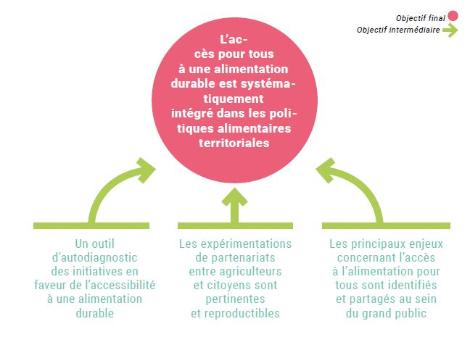AcceCible: Access to sustainable food for all
Six projects supported by the Centres for Initiatives to Enhance Agriculture and the Rural Environment (Civam)
enero 2019
Fondation Daniel et Nina Carasso (FDNC)
Towards a Europe of territorial food systems?
This study is extracted from the analysis of twenty-two French and Spanish projects related to new food models, all highlighting different challenges.
In Spain, governance is being built, while French food systems are looking for solutions to change scale. But in both countries, accessibility remains the weak link.
The AcceCible project questions the conditions of sustainability of the agricultural production model, particularly in terms of accessibility. A bias is displayed: to focus on the families furthest away from access to sustainable food. The actions combine experimentation, the production of operational tools and training and awareness-raising actions for the general public.
France
The network of initiative centres for the valorisation of agriculture and the rural environment (Civam) works for a living and solidary countryside. In 2016, this development actor is launching an action-research project in order to « promote access, in an autonomous and non-stigmatising manner, for all to safe, diversified food, in sufficient quantity, of good taste and nutritional quality, and produced in socially, economically and ecologically sustainable conditions ».

Thanks to a partnership system involving agricultural research, social workers, farmers and beneficiaries, this project aims to support six local experiments in France over a three-year period. These are chosen for the diversity of their audiences and the originality of the proposed solutions. They involve new modes of exchange between actors from the social and agricultural worlds, making each link more responsible, and make it possible to understand the strengths and limitations of the classic food aid model. Their relevance is analysed from four angles: autonomy, participation, consideration of the agricultural issue and product quality.
The project will study the conditions for the success of these initiatives, and will promote and disseminate them. Through these actions, the AcceCible project hopes to contribute to the public debate on the issue of access to sustainable food for all, particularly on issues of aid and quality.
Strengthening links between social and agricultural actors through training
As social workers, IRTS (Regional Institute of Social Workers) students are mainly intended to approach nutrition from the perspective of the food aid prescriber, or the provider of nutritional advice. The lack of a global vision of the chain, particularly of its productive link, has led the Montpellier institute, a partner in the AcceCible project, to offer its students optional in-depth study courses in order to make the link between food insecurity and agricultural production. During these modules, each one is enriched: the agricultural actors share their problems and the students carry out on-farm observation internships to better understand the daily life of farmers, a population also affected by food insecurity.
Thirty years of expertise on the sustainability of farms
To carry out their self-diagnostic tool, the Centres d’initiatives pour valoriser l’agriculture et le milieu rural (Civam) rely on thirty years of work analysing the sustainability of farms. It responds to three objectives:
-
to animate the multi-stakeholder debate by facilitating the expression of everyone’s views,
-
strengthen the understanding of accessibility issues,
-
set collective objectives for improving the project.